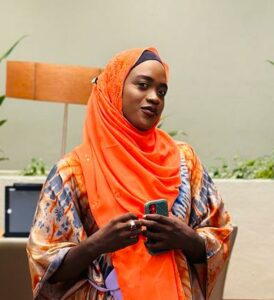In a small town somewhere in Nigeria, there lived a girl named Sarana. Sarana grew up in a lovely family of six, where there was no power struggle or patriarchal influence, and gender roles were undefined. Sarana was the first child of the Baguda family, followed by Dorcas, Mirii, and Abel. Although Sarana was assigned male at birth, Sarana was beautiful and loved wearing wigs and dresses within the home.
As Sarana grew, she developed into a more effeminate person. However, her father grew increasingly uncomfortable and would always complain about having a first child who behaved and acted like the opposite gender. He was never violent but would constantly caution Sarana to act their “assigned gender” whenever they had visitors or relatives over. This action disturbed Sarana; she always felt terrible that her father would boldly misrepresent her. Sarana eventually became estranged from her father due to his actions.
On February 14, 2014, Sarana wore gender-fluid clothes to a Valentine’s Day party. It was fun and ended at about 10:30 p.m. On her way home, the police stopped her cab at a checkpoint. One of the police officers noticed Sarana and proceeded to question whether Sarana identified as male or female. She responded, “I am Sarana. I am on my way home from a Valentine’s Day party.”
The police accused Sarana of breaking the Violence Against Persons (Prohibition) Act recently passed under the government of the then Nigerian President Goodluck Johnathan, which criminalised several components of LGBTQIA+ lives in Nigeria. Sarana was detained at the police checkpoint and eventually transferred to a police station. While in detention, Sarana was harassed and threatened by the police officers who requested that she reveal the names and locations of other “lawbreakers” like her.
Sarana tried reaching her father to no avail. She was eventually able to contact one of her aunts – Aunty Tolu – and all she could say was, “Aunty, help me. Please help me. I want to die”. A policeman took over the conversation and directed the aunt to visit Alakija Metropolitan police station if she wanted to see “the homosexual”.
Aunty Tolu was at the station the following day, seeking more information on Saratu’s arrest and detention. The Investigating Police Officer stated that Saratu would be charged with “displaying unnatural offence and immoral acts in public.” The police officer also said that people like Sarana needed rehabilitation and kept on referring to her as “he.”
With cold anger, Aunty Tolu turned to the police officer and said: “Sarana is a woman. You need to respect her for who she is! She has not violated the Nigerian constitution in any way!” Aunty Tolu ferociously defended Saratu’s identity as a woman even when police threatened to lock her up with Sarana. She was adamant about her stance.
Despite her experience the previous night, Sarana was surprised and excited that another woman boldly addressed her as a woman, irrespective of the people present at the police station. After hours of back-and-forth, the Divisional Police Officer intervened in the case, and Sarana was released.
Sarana and Aunty Tolu left Alakija Metropolitan Police Station at 3 pm on February 15, 2014, hearts heavy but heads held high in defiance, affirming Sarana’s identity as a woman.
Featured Illustration is AI generated.
 Aliyah Baana Ibrahim is a transgender woman from northern Nigeria. She advocates for trans rights and women’s rights and works at the intersection of SRHR, HIV/AIDS, and human rights programming. Aliyah is also an award-winning fellow at the Bisi Alimi Rainbow Academy through Jonathan Cooper. She is a meme queen; her spirit animal is a cat!
Aliyah Baana Ibrahim is a transgender woman from northern Nigeria. She advocates for trans rights and women’s rights and works at the intersection of SRHR, HIV/AIDS, and human rights programming. Aliyah is also an award-winning fellow at the Bisi Alimi Rainbow Academy through Jonathan Cooper. She is a meme queen; her spirit animal is a cat!
This story is first in our series in collaboration with the Yemoja Feminista Fellowship run by CHEVS, a queer feminist organisation dedicated to advancing social justice and strengthening LGBTQI+ movements across West Africa. The series will feature insightful analyses, and fervent calls to action from young feminists addressing issues across gender, culture, and human rights in West Africa. The stories offer personal viewpoints on the struggles and victories of feminist activism in the region and the critiques of systemic injustices. The authors prompt us to face uncomfortable realities, question entrenched norms, and imagine a future where all people are free to live authentically and thrive.
Amidst growing complexities, regressive attitudes and laws targeting LGBTQIA+ rights, attacks on sexual and reproductive health rights by anti-gender networks, and the enduring impact of colonial legacies and harmful cultural practices, storytelling remains a vital tool. It challenges stereotypes, centers marginalized and minoritized voices, advocates for healing justice and collective care. In stories we honor the legacy of African feminisms and the tireless work to dismantle intersecting oppressive systems and create a vision of the future grounded in equity, justice, and love. – Rosebell Kagumire, Editor, African Feminism.
